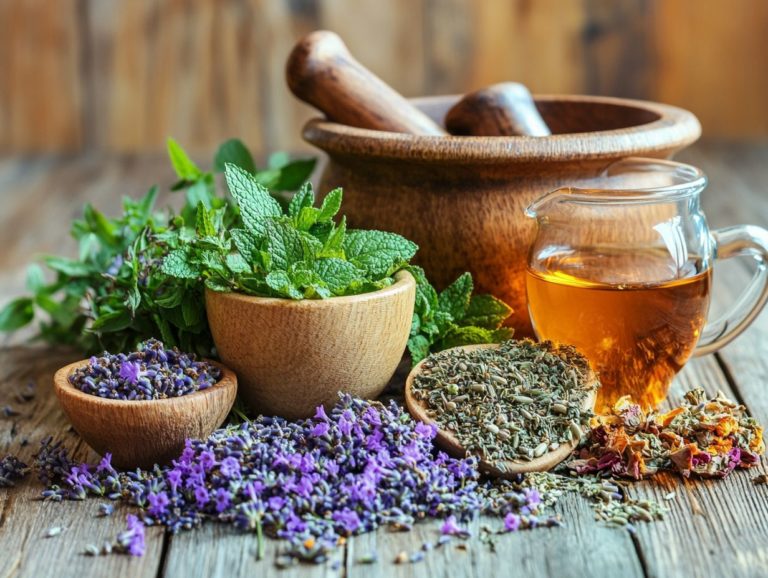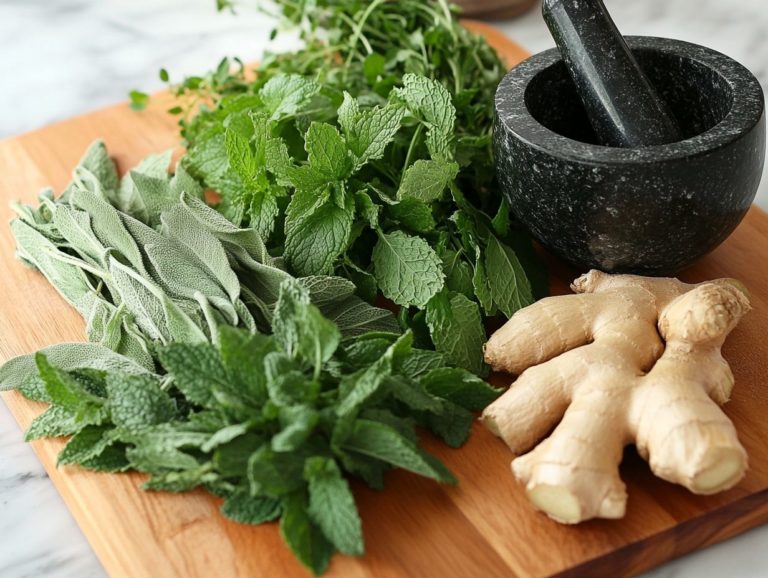Top Herbal Solutions for Heartburn
Heartburn can be an uncomfortable and disruptive condition, often leaving you in search of effective relief. While over-the-counter medications may be your go-to, many are now turning to nature for answers.
Let’s explore a variety of herbal remedies renowned for their soothing properties, such as ginger, chamomile, turmeric, and probiotics. This article outlines how these natural remedies work, their potential side effects, important precautions to keep in mind, and their suitability for long-term use.
Discover how you can harness the power of herbs to ease heartburn, often exacerbated by trigger foods and lifestyle changes, and reclaim your comfort.
Contents
- Key Takeaways:
- 1. Ginger
- 2. Chamomile
- 3. Slippery Elm
- 4. Licorice Root
- 5. Aloe Vera
- 6. Peppermint
- 7. Fennel
- 8. Marshmallow Root
- 9. Dandelion Root
- 10. Turmeric
- 11. Apple Cider Vinegar
- 12. Baking Soda
- 13. Probiotics
- 14. Papaya
- 15. Cumin
- What Causes Heartburn and How Can Herbal Solutions Help?
- Frequently Asked Questions
Key Takeaways:

- Use ginger, chamomile, and slippery elm to reduce heartburn symptoms due to their anti-inflammatory properties.
- Licorice root, aloe vera, and peppermint can help ease heartburn symptoms by soothing the esophagus, which can become irritated by excessive stomach acid, and reducing acid production.
- Fennel, marshmallow root, and dandelion root are other herbal options that can provide relief from heartburn discomfort and promote digestive health.
1. Ginger
Ginger stands out as a highly regarded herbal remedy, celebrated for its remarkable ability to ease symptoms linked to GERD (gastroesophageal reflux disease). Its anti-inflammatory properties and role in stomach acid production make it a versatile ally. This herb soothes the esophagus and promotes digestive health by reducing nausea and supporting overall digestion.
Incorporating ginger into your routine can be a significant step toward reducing digestive discomfort and enhancing your well-being naturally.
To savor ginger, enjoy a comforting cup of ginger tea or add fresh or dried ginger to your favorite dishes like stir-fries or soups. To make a soothing cup of ginger tea, steep fresh ginger slices in hot water for a few minutes. You can elevate the flavor by mixing in a touch of honey or a splash of lemon.
Research shows that this remarkable root not only eases heartburn but also improves how quickly food leaves the stomach. Many testimonials from individuals dealing with GERD emphasize improved comfort levels after regularly incorporating ginger into their diets, highlighting its potential as a natural remedy for various issues, including herbal solutions for managing hypertension.
2. Chamomile
Chamomile is a beloved herbal remedy that can ease heartburn symptoms and support your digestive health, thanks to its anti-inflammatory properties.
Chamomile can also help with anxiety, which may trigger heartburn. This gentle herb has been valued for centuries for its ability to promote relaxation, making it a favorite for managing stress. By soothing your nervous system, chamomile fosters a tranquil mindset, helping you navigate life’s challenges with more ease. Additionally, exploring top herbal solutions for cramps may provide further natural relief.
If you’re looking to incorporate chamomile into your routine, you have delightful options sipping on soothing tea infusions or opting for convenient capsules, both of which offer the plant’s numerous benefits.
However, it’s wise to keep in mind potential allergic reactions for those sensitive to plants in the daisy family. Always consult your healthcare provider before introducing any new supplement into your regimen.
3. Slippery Elm
Slippery elm is an herbal remedy that you might find particularly beneficial for its soothing effects on the esophagus. If you re dealing with heartburn or gastroesophageal reflux disease (GERD), this remedy is a great option, thanks to its sticky substance that coats and protects your digestive tract.
This unique substance not only helps alleviate inflammation, which is often at the root of heartburn but also promotes overall digestive health by forming a protective barrier against irritants. Many people discover relief by enjoying slippery elm in various forms perhaps as a soothing tea made by boiling the inner bark in water. You might also try it as a powder that can be seamlessly blended into smoothies or yogurt.
It can offer considerable benefits, but be aware that some individuals might experience mild side effects, such as digestive discomfort or allergic reactions. It s always wise to consult with a healthcare professional before embarking on any new herbal regimen to ensure you re on the right track for safety and effectiveness.
4. Licorice Root
Licorice root, especially in its deglycyrrhizinated form (DGL), is celebrated for its remarkable ability to soothe your digestive tract and alleviate symptoms of heartburn, gastroesophageal reflux, and inflammation by supporting the mucosal lining of your stomach and esophagus.
DGL presents a safer alternative for heartburn, which may come with unwelcome side effects like elevated blood pressure due to glycyrrhizin. This form not only helps to manage stomach acid but also promotes overall digestive health by reducing inflammation and bolstering the mucosal barrier.
If you re seeking relief from digestive discomfort, consider incorporating DGL into your routine in various forms such as chewable tablets, powders, or capsules. Doses typically range from 380 mg to 1,000 mg, taken before meals or whenever symptoms arise.
By opting for DGL, you can reap the benefits of licorice without the potential pitfalls, making it a smart choice for enhancing your gastrointestinal health.
5. Aloe Vera
Aloe vera stands out as an extraordinary plant, celebrated for its soothing properties, especially when it comes to promoting digestive health. Its anti-inflammatory effects work wonders in alleviating heartburn and gastroesophageal reflux by calming the esophagus and stomach lining.
You can enjoy the benefits of this remarkable plant in various ways, such as sipping on pure aloe vera juice. This juice is reputed to enhance gut health and provide relief from a range of digestive discomforts. Aloe vera has also gained recognition for its gentle laxative qualities, helping you maintain regularity without the harsh side effects often associated with other remedies.
To truly harness its potential, choose juice that is pure and free from additives or sugars. Exercise caution when adding aloe vera to your routine. Consuming it in large quantities or if you have certain underlying health conditions could lead to unwanted effects.
Consulting a healthcare provider before adding aloe vera to your regimen ensures that you re using it safely and effectively. Choose pure aloe vera juice today for the best results!
6. Peppermint
Peppermint is a beloved herb often touted for its digestive benefits, but it can also be tricky for heartburn. It has the potential to relax the lower esophageal sphincter, which might trigger symptoms in some individuals.
For many, though, adding peppermint to your diet can bring a soothing sensation, especially when enjoyed as peppermint tea, renowned for its ability to relieve bloating and gas. This herb can even stimulate bile production, enhancing the digestive process. Beyond tea, you can embrace peppermint in various forms whether as an essential oil or in convenient capsules, its versatility is a definite perk.
However, it s crucial to remember that while peppermint can serve as a remedy for occasional heartburn, those who experience more severe symptoms should proceed with caution. Understanding how peppermint affects you allows for informed choices about its incorporation into your routine. Imagine enjoying a warm cup of peppermint tea to soothe your tummy!
7. Fennel

Fennel is an aromatic herb that deserves a place in your kitchen. It s renowned for enhancing digestion and can help alleviate symptoms of heartburn and inflammation.
You can easily incorporate fennel into your meals; simply toss fresh leaves into salads, grill the bulbs as a delightful side dish, or infuse seeds into sauces and marinades. Consider indulging in fennel tea, crafted by steeping the seeds in hot water. This soothing beverage not only aids digestion but also helps reduce bloating and gas.
While fennel offers numerous benefits, it s essential to approach it with care. Excessive consumption may lead to potential side effects, including allergic reactions or interactions with certain medications, particularly for those undergoing hormonal therapies. Therefore, practicing moderation is crucial to fully optimize its health benefits.
8. Marshmallow Root
Marshmallow root has a rich history in herbal medicine, celebrated for its soothing properties that can ease heartburn and promote digestive health. Its remarkable ability to reduce inflammation protects the mucous membranes the protective layer in your digestive tract making it a valuable ally for your gut.
When mixed with water, this extraordinary herb forms a gel-like consistency that coats the lining of your digestive tract, offering relief from irritation. If you’re looking to incorporate this potent herb into your daily routine, consider brewing it as a tea. Simply steep the roots in hot water, allowing their beneficial compounds to infuse into your drink.
For those who prefer a more convenient option, marshmallow root is also available in capsules or tinctures. Regular consumption of this herb may not only enhance your overall gut health but also alleviate symptoms associated with gastrointestinal disorders, ultimately improving your quality of life.
9. Dandelion Root
Dandelion root is an often-overlooked herbal remedy that can significantly enhance your digestive health. By promoting bile production, it aids in breaking down stomach acid, providing relief from pesky symptoms like heartburn and acid reflux.
Beyond its digestive benefits, this remarkable root finds its way into herbal teas, offering soothing properties for your stomach and a delightful, earthy flavor that refreshes the palate. Many health enthusiasts appreciate its detoxifying abilities as it supports liver cleansing and contributes to overall gastrointestinal wellness.
However, keep in mind that while dandelion root can indeed be beneficial, you should exercise caution if you are on specific medications, particularly diuretics or blood thinners, as interactions may occur. Consulting with a healthcare provider before adding this herbal remedy to your routine is always a prudent decision.
10. Turmeric
Turmeric, celebrated for its remarkable anti-inflammatory properties, stands as a powerful natural remedy for heartburn and acid reflux by enhancing digestive health and alleviating inflammation in the esophagus and stomach.
Incorporating turmeric into your diet can be effortless; simply add it to your meals, beverages, or supplements. For instance, you can sprinkle it into curries, soups, or smoothies, enriching flavor while reaping its health benefits.
Scientific studies have shown that curcumin, the active compound in turmeric, can help ease symptoms related to digestive disorders and may even bolster the gut microbiome. However, it’s wise to proceed with caution, as high doses might lead to gastrointestinal discomfort, including nausea or diarrhea.
Always consult a healthcare professional before significantly boosting your turmeric intake, ensuring it aligns with your individual health needs.
Don’t wait start enjoying the benefits of these herbs today! Take charge of your digestive health with these powerful herbal allies!
11. Apple Cider Vinegar
Apple cider vinegar is often praised as a natural remedy for various digestive issues, including heartburn. When used appropriately, it can help balance stomach acid levels and enhance overall digestive health.
When consumed in moderation, it has the potential to soothe symptoms by promoting the proper flow of digestive juices. If you’re experiencing discomfort, consider diluting one or two tablespoons in a glass of water before meals for relief.
While the benefits are certainly appealing, it’s important to exercise caution due to its high acidity. It can irritate the throat or erode tooth enamel if taken undiluted. Talk to a healthcare professional to ensure your approach is safe and tailored to your health needs!
12. Baking Soda
Baking soda is a common household item that neutralizes excess stomach acid and provides quick heartburn relief. When used correctly, it can be a convenient solution for occasional indigestion or acid reflux.
However, it’s crucial to adhere to the recommended dosages; overconsumption can lead to electrolyte imbalances or even alkalosis. Remember, it doesn’t tackle the root causes of heartburn.
For chronic issues, consult with a healthcare professional for a comprehensive treatment plan. Relying solely on home remedies like baking soda might overlook more serious underlying conditions.
13. Probiotics
Probiotics are essential for maintaining digestive health. They can help alleviate heartburn and acid reflux.
These beneficial bacteria enhance gut flora, improving nutrient absorption and your overall vitality. They also bolster your immune system, vital for preventing digestive disorders.
You can easily integrate probiotic-rich foods like yogurt, kefir, sauerkraut, and kimchi into your daily meals. Don t wait! Start incorporating probiotics into your meals today for a happier gut!
If you re looking for a more concentrated dose, probiotic supplements are widely available, offering specific strains tailored to your individual needs.
Utilizing the strength of probiotics can set the stage for a healthier digestive system.
14. Papaya

Papaya is a remarkable tropical fruit celebrated for its digestive enzymes, particularly papain, which can significantly aid digestion and may alleviate discomfort from excess stomach acid.
Beyond its digestive benefits, papaya is an outstanding source of vitamins A and C. These vital nutrients offer anti-inflammatory advantages that can further support gut health.
To make the most of this versatile fruit, consider adding ripe papaya to your smoothies or salads, or even utilizing it as a natural meat tenderizer thanks to the papain enzyme.
For optimal results, try enjoying fresh papaya on an empty stomach or shortly after meals. This timing ensures that the digestive enzymes are readily available to promote overall digestive wellness.
Incorporate fresh papaya into your diet now for improved digestive wellness!
15. Cumin
Cumin is a spice renowned for its impressive therapeutic properties, frequently featured in diverse cuisines. It s known to support digestive health and may alleviate symptoms of heartburn and inflammation within the digestive tract.
Incorporating this aromatic spice into your daily meals is simple and rewarding. A sprinkle of cumin in soups, stews, or curries can elevate flavors while offering its digestive benefits.
Its versatility shines when paired with grilled vegetables and meats, making it an excellent addition to any balanced diet. Rich in antioxidants, cumin not only aids digestion but also has the potential to boost your immune system and promote overall health.
By including cumin in your meals, you can savor its unique flavor while enjoying the myriad benefits it brings to your gut health.
What Causes Heartburn and How Can Herbal Solutions Help?
Heartburn is a common ailment that affects millions. It occurs when stomach acid flows back into the esophagus. Many factors contribute to this, including dietary choices, obesity, and stress. This discomfort can disrupt your daily life. The good news? There are numerous natural remedies and lifestyle changes available to help.
These remedies target the underlying causes of heartburn, such as inflammation and trigger foods, while promoting better digestive health.
Common dietary triggers include spicy foods, caffeine, fatty meals, and citrus fruits. These can relax the muscle at the bottom of the esophagus, leading to that familiar burning sensation. Lifestyle factors like lack of exercise, poor posture during meals, and smoking can also worsen the condition.
You might explore herbal solutions like ginger, known for its anti-inflammatory properties, or chamomile tea, celebrated for its soothing effects on digestion. Incorporating these remedies, along with herbal solutions for IBS management, mindful eating habits, and regular physical activity, can enhance your digestive health and help manage heartburn symptoms.
How Do These Herbal Solutions Work to Relieve Heartburn?
Herbal solutions can relieve heartburn by targeting inflammation, improving digestive health, and soothing the esophagus and stomach lining. This ultimately enhances your body s ability to manage stomach acid.
These plants are rich in antioxidants and anti-inflammatory compounds. They calm irritated tissues in your gastrointestinal tract. For instance, chamomile and licorice help reduce inflammation, while marshmallow root creates a protective barrier on the lining, shielding it from harsh acids. Additionally, using herbal solutions for cardiovascular health can further support your overall wellness. Herbs like ginger can also aid digestion by minimizing gas and bloating, two common culprits that worsen heartburn.
Herbal remedies promote mucosal health, creating an environment better equipped to withstand the corrosive effects of stomach acid. For those experiencing discomfort, exploring herbal solutions for coughs and throat irritation can also provide relief. Together, these mechanisms foster a balanced digestive system, offering relief and enhancing your overall well-being.
What Are the Possible Side Effects of Using Herbal Solutions for Heartburn?
While herbal solutions can offer benefits, stay alert to potential side effects and interactions that may arise. Not all natural remedies are a one-size-fits-all solution.
Some individuals may experience mild gastrointestinal upset or allergic reactions when using herbs like peppermint or licorice. Certain remedies can interfere with prescription medications, affecting their effectiveness or causing unwanted side effects. For instance, licorice root can elevate blood pressure, particularly when combined with diuretics.
Consulting with a healthcare provider before starting any new treatment is essential. They can evaluate your individual health conditions and current medications, ensuring that the herbal remedy you choose won t introduce unnecessary risks.
Are There Any Precautions to Take When Using Herbal Solutions for Heartburn?
Taking precautions when using herbal solutions for heartburn is vital to ensure safety and effectiveness, especially if you have underlying health conditions or are on specific medications.
Before integrating any new remedy into your routine, consult with a healthcare professional. Adhering to recommended dosages is crucial; exceeding these can lead to unwanted side effects. Always choose high-quality herbal products from reputable sources to ensure they re free from contaminants and accurately labeled.
Being aware of potential side effects and interactions with other treatments can help you avoid risks.
Keeping a journal to track your experiences can also be beneficial. This way, you can identify what works best and make informed decisions about long-term use.
Wondering how to get started? Consult a healthcare provider or consider trying herbal solutions responsibly!
Can These Herbal Solutions Be Used as a Long-Term Treatment for Heartburn?
Herbal solutions can be effective long-term treatments for heartburn. Monitor your symptoms and consult with doctors or specialists as needed.
As you explore these remedies, consider embracing lifestyle changes. Modifying your diet and adopting stress management techniques can enhance the effectiveness of your herbal solutions.
Regularly assess your symptoms to see how well these treatments work. This will also help you identify triggers that may worsen your condition.
This holistic approach deepens your understanding of your health. It promotes a balanced lifestyle that supports ongoing well-being.
Set yourself up for success in managing heartburn symptoms over time.
Frequently Asked Questions

What are the top herbal solutions for heartburn?
Some of the top herbal solutions include ginger, licorice root, chamomile, fennel, slippery elm, and aloe vera.
Can ginger help with heartburn?
Yes, ginger can reduce inflammation in the esophagus and stomach, providing relief from heartburn.
Is licorice root effective for heartburn?
Yes, licorice root has been used for centuries to soothe the lining of the esophagus and reduce acid reflux.
How does chamomile help with heartburn?
Chamomile calms the digestive system, reducing heartburn symptoms. It also helps with stress and anxiety, which can contribute to heartburn.
Can fennel seeds provide relief from heartburn?
Yes, fennel seeds act as a digestive aid and help reduce acid reflux.
Is slippery elm effective for heartburn?
Yes, slippery elm contains a gel-like substance that can coat the esophagus and stomach, providing relief. It also reduces inflammation in the digestive tract.






